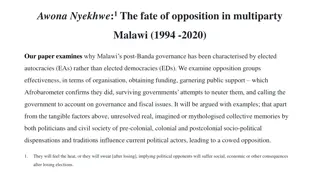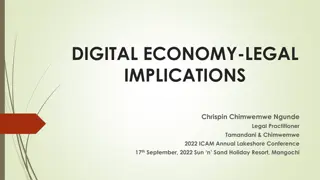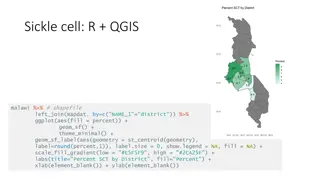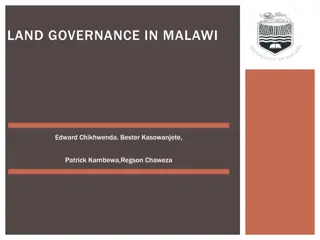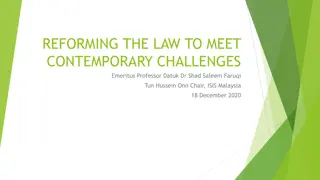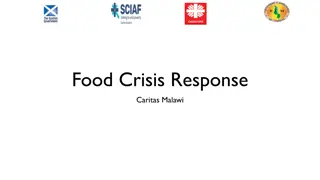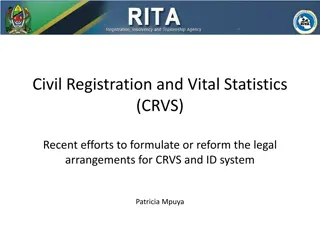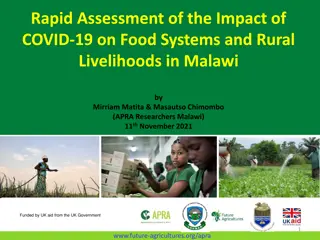Role of Law Reform Agencies in Legal Policy Development: A Case for the Malawi Law Commission by Eddah Chavula
Malawi's history, legal policy development, and the crucial role of the Law Commission in reviewing laws for conformity with the Constitution are highlighted. The Commission plays a vital role in enhancing access to justice and ensuring rights for all citizens through legal reforms.
Download Presentation

Please find below an Image/Link to download the presentation.
The content on the website is provided AS IS for your information and personal use only. It may not be sold, licensed, or shared on other websites without obtaining consent from the author. Download presentation by click this link. If you encounter any issues during the download, it is possible that the publisher has removed the file from their server.
E N D
Presentation Transcript
The role of Law Reform Agencies on Legal Policy Development of a Country: A Case for the Malawi Law Commission Presented by Eddah Chavula
OUTLINE Introduction Definition of Legal Policy Powers and Functions of the Commission Law Reform Process The role of the Commission to legal policy development in Malawi Conclusion
Introduction Malawi is a former colony of Britain as such inherited most of its laws from the colonial government. At Malawi s independence in 1964 most of the laws developed during the British rule were formally adopted. In 1994, Malawi adopted multiparty democracy replacing the one party rule and adopted a new constitution which enshrines democratic and human rights principles. The 1994 Constitution provided for the establishment of the Law Commission under section 132. The core mandate of the Commission is to review and make recommendations relating to the repeal and amendment of laws.
Definition of Legal Policy Development Legal means allowable or enforceable by being in conformity with the law of the land and public policy. Policy is defined as the general principles by which a government is guided in its management of public affairs, or the legislature in its measures. Policy when applied to law, ordinance or Rule of Law, means the general purpose or tendency considered as directed to the welfare or prosperity of the state or community. Legal policy development can therefore be understood as the process of changing, improving, modernizing, reforming, reorganizing, refining, among others, enforceable general principles aimed at guiding government in the management of public affairs or the legislature in its measures for the welfare or prosperity of the state.
Contd Law reform is a mechanism by which many countries use to change the substantive law for the better and also accommodate social, economic, technological and cultural changes taking place in the society. Since law reform focuses on the state or condition of the law at that particular time, law reform agencies play a crucial role towards legal policy development in the country. The Commission has played an important role in the development of legal policy aimed at increasing access to justice by ensuring that more people have meaningful access to formal justice institutions and informal dispute resolution processes, the legal process, the substance of the law and ensuring that rights and benefits are available to everyone through the mechanism of law.
Powers and Functions Include reviewing and making recommendations regarding any matter pertaining to the laws of Malawi and ensuring their conformity with the Constitution and applicable international law. The Law Commission Act under section 6, provides for detailed functions of the Commission such as systematic development and reform of the law; and codification of any branch of laws.
Law Reform process Five stages Stage I: Identification of a Law Reform Area Receives submissions from individuals or bodies; on its own volition to implement of domesticate country s obligations under international conventions or as a response to social change. Stage II: Investigation Program Officers are assigned. Development of Working papers. Stage III: Appointment of Commissioners Section 133 of the Constitution Stage IV: Consultation Stage V: Recommendations
The role of the Commission to legal policy development in Malawi About thirty-five (35) law reform programs have been carried out . Law reform in Malawi has influenced legal policy development in areas such as criminal justice system; gender related laws; children related laws; and land related laws.
1. Criminal Justice System Review of the Penal Code aimed at, inter alias, introduction of new offences to punish new forms and ways that have emerged of committing certain crimes. For example, (i) creation of a new provision prohibiting sexual activities for commercial purposes to counteract the illicit trafficking of women, girls and boys for sexual purposes within Malawi and outside; (ii) to amend provisions on abduction and to proscribe the maintenance of brothels; and (iii) proscription of abuse of children through their engagement in activities such as pornography, pedophilia and the drug courier trade.
Contd Review of the Criminal Procedure and Evidence Code Aimed to introduce new approaches to criminal procedure and practice focusing on individual rights and also closing a lot of gaps in both pre-trial and trial procedure. Also, aimed at ensuring a system of criminal justice that is efficient, accessible, fair, and accountable and which reflects the aspiration of the Constitution and the needs of special interest groups, gender concerns and cultural norms and values.
Gender Related laws Most societies in Sub-Saharan Africa based on patriarchal norms that places more value on masculinity as such most women occupy the lower structure of the society. The Commission has contributed to legal policy development aimed at elevating the status of women through the promotion and protection of the rights of women. 1. Wills and Inheritance Act reviewed in 2004 to offer more stringent protection to Orphans and Vulnerable Children (OVC), widows and widowers. The new Act makes provision for making of wills and devolution of property under a will; the inheritance of the estates of persons dying without valid wills; protection of deceased estates; and administration of deceased estates; prosecution of offences relating to deceased estates; civic education of the public; and functions of courts in relation to deceased estates. For example, it has restricted the definition of member of immediate family in relation to any person to mean that person s spouse and children.
Contd 2. The Gender Equality Bill which was enacted into law in 2013. Promoting gender equality, equal integration, influence, empowerment, dignity and opportunities, for men and women in all functions of society. The Act prohibit sex discrimination (section 4), prohibit harmful practices (section 5) and introduces quotas in the public service (section 11). E.g.Section 11 of the Gender Equality Act, provides that an appointing authority in the public service shall appoint no less than forty per cent (40%) and no more than sixty per cent (60%) of either sex in any department in the public services.
Contd 3. Marriage, Divorce and Family Relations Act enacted in 2015 brought in new developments in the legal policy of the country. To reform the statutory and customary laws on family relations in order to address the imbalances existing in the laws and to afford better protection to women and children. New law provides for, (i) fair distribution of matrimonial property; (ii) maintenance of pregnant women married or not; (iii) maintenance and custody of children, among others; (iv) prohibit forced marriages or arranged marriages without the consent of either party; (iv) Prohibits harmful cultural practices like wife inheritance It protects and promotes the rights of both husband and wife in a marriage, children of the family, single pregnant women, men and women who merely live together as husbands and wife without any marriage formalities (cohabitation).
Contd 4. Prevention of Domestic Violence Act enacted in 2006 to protect men, women and children in abusive domestic relationships. Its implementation has been marred by challenges and a technical review of the Act has been done by the Commission. The Commission has so far made recommendations, for example, relating to the expansion of the definition of domestic violence to include none criminal acts.
Children Related Laws 1. Technical Review of the Constitution led to the inclusion of the universal human rights principle that the best interest of children should be a primary consideration when decisions on their welfare are taken, under section 23 (1) of the Constitution. 2. The review of the Children and Young Persons Act led to the enactment of the Child Care, Protection and Justice Act in 2010. Introduced extensive legal framework surrounding child justice and the care and protection of children. New provisions covering such areas as duties and responsibilities of parents towards their children; determination of children in need of care and protection; guardianship; fosterage; residential placements; powers and procedures of child justice courts in care and protection matters; duties and functions of local authorities relating to child care and protection; and protection of children from undesirable practices. Has put emphasis on rehabilitation of child offenders and their reintegration into society.
Contd 3. Development of Trafficking in Persons legislation to respond to the global phenomenon of trafficking in persons and also domesticates Malawi s international obligations. It makes provision for the prevention and elimination of trafficking in persons; establishment of a Board for coordinating and management of matters relating to trafficking in persons; and provision for care, assistance and protection of trafficked persons, among others. For example, the new law creates an offence of trafficking in children which attracts a prison sentence of twenty-one years without the option of a fine.
Land Related Laws Review of land-related laws with a view of developing a new legislative framework for land matters that articulates the principles of the National Law Policy. The Commission conducted the review and developed proposed legislation namely, the Land Bill (now Land Act), Customary Land Bill (now Customary Land Act) and Registered Land (Amendment) Act, among others. The new legislation has introduced a new classification of land into Public Land, Private Land and Customary Land. The Land Act vests all public and customary land in perpetuity in the Republic as opposed to the previous position where it was vested in the President in order to curb abuse of authority.
Contd The Customary Land Act creates customary estates which is any customary land that is owned, held, or occupied as private land within a Traditional Land Management Area and is registered as such under the Registered Land Act. Section 4 of the Act establishes Customary land committees headed by the Group village headman and comprising of six other persons recognized and respected by the community, at least three of which shall be women appointed by the Group village headman in consultation with other village headmen of the area.
Conclusion Therefore, it can be noted that law reform undertaken by law reform agencies as far as legal policy development is concerned is closely linked to access to justice in the country. Hughes observes that law reform commissions have great potential in contributing to access to justice by understanding their explicit mandates to include, increasing access to justice. The Commission in contributing to legal policy development has adopted different approaches to law reform. (i) Empirical research which explores who is doing what, to whom and the reasons behind such actions. (ii) Comparative legislation which is in most cases followed up with a study visit to the country in question for the Commission to understand the environment and legislative history behind the comparative legislation. (iii) The Commission has also adopted innovative communication using the media and other communication strategies e.g. a website and a Facebook page so as to attract different people to engage in the law reform. (iv) It furthermore places more value on public participation in the law reform process through wide public consultation to ensure ownership of the proposals i.e. policy or legislative proposals.



